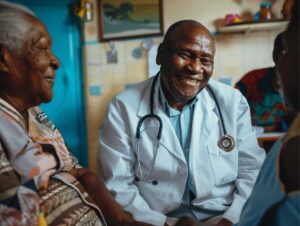 Johannesburg – On World Diabetes Day, JSE-listed Aspen Pharmacare Holdings Limited (“Aspen”), a global multinational specialty pharmaceutical company, continues to highlight the alarming impact of South Africa’s increasing type 2 diabetes burden.
Johannesburg – On World Diabetes Day, JSE-listed Aspen Pharmacare Holdings Limited (“Aspen”), a global multinational specialty pharmaceutical company, continues to highlight the alarming impact of South Africa’s increasing type 2 diabetes burden.
According to the Lancet Global Burden of Disease, Injuries, and Risk Factor Study (“GBD 2023”), global life expectancy has increased by about 10 years since 1990. South Africa, however, paints a very different picture with life expectancy shown to have declined by 1,2 years from 67,73 years to 66,55 years over the same period. This decrease is driven by non-communicable diseases (“NCDs”) such as diabetes, cardiovascular disease, hypertension and other conditions.
Approximately 4,6 million adults aged 20 – 79 are diagnosed locally with type 2 diabetes which is considered to be a concerning South African public healthcare burden. This disease has surpassed tuberculosis as the leading natural cause of death in the country.
Stavros Nicolaou, Aspen Group Senior Executive Strategic Trade said, “It is alarming to note that premature deaths from diabetes have increased by 5% since 2000[1], this while premature mortality from other major NCDs is decreasing. It is evident that the high diabetes rate linked to premature death could be addressed through access to high quality, equitable care and treatment. Aspen is making significant progress in our previously stated strategy to provide affordable treatment options to type 2 diabetes patients, through among others, a cumulative investment over the last five years of more than R8 billion in sterile manufacturing capacity, and key multinational pharmaceutical partnerships.”
“The prevailing trend between obesity, diabetes, and cancer, which exacerbates metabolic-cardio-renal complex diseases, continues to impact an over-burdened healthcare system, which is not sufficiently geared to provide care and equitable access to treatment to our diverse society. This situation continues to have a dire economic, productivity, social and life expectancy impact on South Africa and across the African continent. High quality treatment options are available, but these are not within the financial means of all patients. Eliminating sedentary, unhealthy lifestyles which could also reduce obesity rates, could assist in reducing the diabetes burden. As part of our World Diabetes Day efforts, we encourage individuals to actively engage in reducing NCDs as a national healthcare disease burden by assessing their risk of diabetes and seeking appropriate, effective treatment and support through registered healthcare professionals.”
The World Health Organisation’s (“WHO”) Global Diabetes Compact calls for the reduction of diabetes through equitable access to comprehensive, affordable and quality treatment and care. In September 2025, the WHO added GLP-1 agonist to its Essential Medicines List for the treatment of type 2 diabetes in adults with cardiovascular disease, chronic kidney disease, or obesity. The Compact strives to support the prevention of type 2 diabetes from obesity, unhealthy nutrition and physical inactivity. According to the WHO, approximately 6%, or more than 420 million of the world’s population, are diagnosed with type 1 or type 2 diabetes. This number has quadrupled since 1980 and it is estimated to rise beyond half a billion by 2030.
[1] World Health Organisation, Global Diabetes Compact https://www.who.int/initiatives/the-who-global-diabetes-compact/the-global-diabetes-compact-forum


